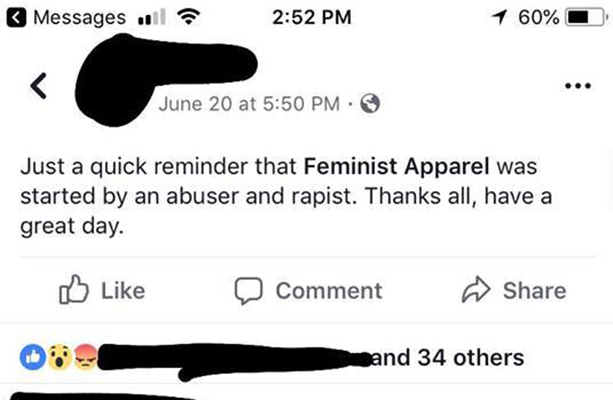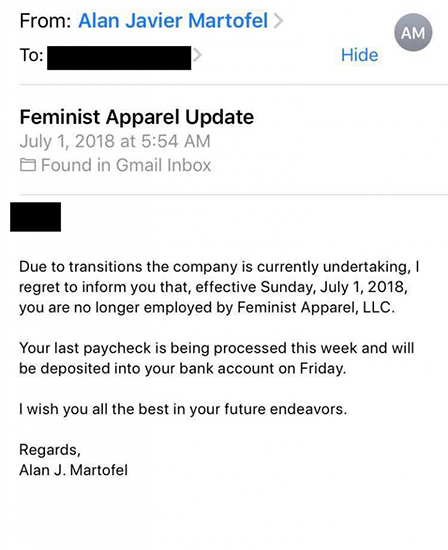Strategy July 12, 2018
Feminist Apparel in Turmoil After Airing of CEO's Sexual History
Alan Martofel fired his staff after they confronted him about his past misconduct.
In a Nutshell
*The founder of a feminist T-shirt brand admitted to sexual assault in a years-old Facebook post, then fired employees after they discovered it.
*Transparency and authenticity are key for brands, particularly when their mission includes political activism.

Alan Martofel, founder and CEO of Feminist Apparel
Employees of a feminist T-shirt brand thought they were creating tools for social change. Feminist Apparel, a well-known for-profit online clothing company, is now in turmoil after those same employees discovered that the company’s founder had an admitted history of sexual misconduct.
Apparel has always been a staple of social justice, especially in recent years, with activists wearing their message across their chests at events like the Women’s March, Pride parades or to support the #MeToo movement. Feminist Apparel, with apparel and accessories aimed at fighting rape culture and empowering women, has been a popular destination for outfitting such movements – selling shirts with messages like “Cats Against Catcalls” and “Proud Latinx Feminist.”
Amassing more than 200,000 Facebook fans and over 130,000 Instagram followers, Feminist Apparel was behind viral moments like the “No Catcall Zone,” posting signs decrying street harassment throughout New York City in 2015. It also formed partnerships with artists and nonprofits, occasionally raising money for causes.
But behind the scenes of the company’s activism work, Alan Martofel, founder and CEO, was concealing a history of sexual misconduct from his employees and customers. In June, Feminist Apparel employees started investigating their boss’ controversial past after someone on Facebook accused Martofel of rape.

After some digging, the employees discovered a rambling Facebook post Martofel published back in 2013, where he talks about taking advantage of drunk women and groping women without consent. The post included the following:
“We’ve all either faced this firsthand, seen it, heard a firsthand account of it, or are guilty of it ourselves. I’m someone who’s guilty of it. I’ve grinded up on women on buses and at concerts without their consent. I’ve made out with ‘the drunk chick’ at a party because it was easier.”
In the post, he also admitted to putting a sleeping woman’s hand on his genitalia. Martofel concluded by announcing that he had created Feminist Apparel in hopes to make up for his past, a departure from the origin story he shared with Forbes in 2014.
In a staff meeting in June, the company’s employees confronted Martofel about sexual allegations and demanded his resignation. The dumbfounded CEO responded that he would “look into necessary steps” regarding the issue. Instead, Martofel fired the nine employees via email within days of the confrontation. Only one staff member, based off-site, remained.

The man running @FeministApparel fired me along with the rest of his staff bc we had a problem with him being a sexual abuser and profiting from it #notbuyingFA pic.twitter.com/PQZA6gPgWJ
— kerrific 🌈 (@kerridraws) July 4, 2018
Martofel had declined to address the issue publicly until his former employees spoke out on social media and to several news outlets. The ex-employees have taken action by launching a Tumblr page that includes a press release, screenshots and further details about the controversy.
“In my mind, the main takeaway from this entire situation is that an abuser is profiting from victims of abuse, and he let the staff go so he can continue to profit,” says Kerri Grogan, until recently a graphics designer and communications associate for Feminist Apparel. “This isn't ethical, it isn't feminist, and it's a prime example of how allies should not behave.”
The company did eventually address the issue on social media.
But it wasn’t enough. Customers were still angry and began canceling orders and complaining about social media comments on Feminist Apparel posts being deleted.
I have just become aware of the issues at @FeministApparel. Today I sent an email requesting all CandyPunk designs be removed. Full statement here: https://t.co/9bDy8s59oY #NotBuyingFA
— Candy Punk (@candypunkco) July 5, 2018
In a follow-up post, Feminist Apparel says it will be undergoing some management changes including choosing a new CEO. Martofel also posted a response to the controversy on the company blog.
“While I continue to regret my past behaviors, my ongoing reflection and conversations regarding them have helped to shape me into who I am and have given me the tools to build an organization that has always strived to be a safe and welcoming space for all.”
To Feminist Apparel’s former employees, the response is just lip service. “Saying (you’re) a feminist, activist or an ally doesn't automatically make it true,” Grogan says. “Your beliefs are reflected in your actions, and if your actions aren't speaking loud enough, they need to be stronger.”
In the era of anonymous, online shopping, it’s not always easy to tell who is profiting from that T-shirt that ends up in your virtual cart. Even companies that seem to be hitting all the right notes could be hiding some unsavory skeletons in their closet. The saga unfolding at Feminist Apparel holds lessons even for suppliers and distributors that strive for neutrality when it comes to activism and politics. In essence, the best way to avoid PR disasters like these is for company executives to be transparent and authentic with both their staff and clientele.
